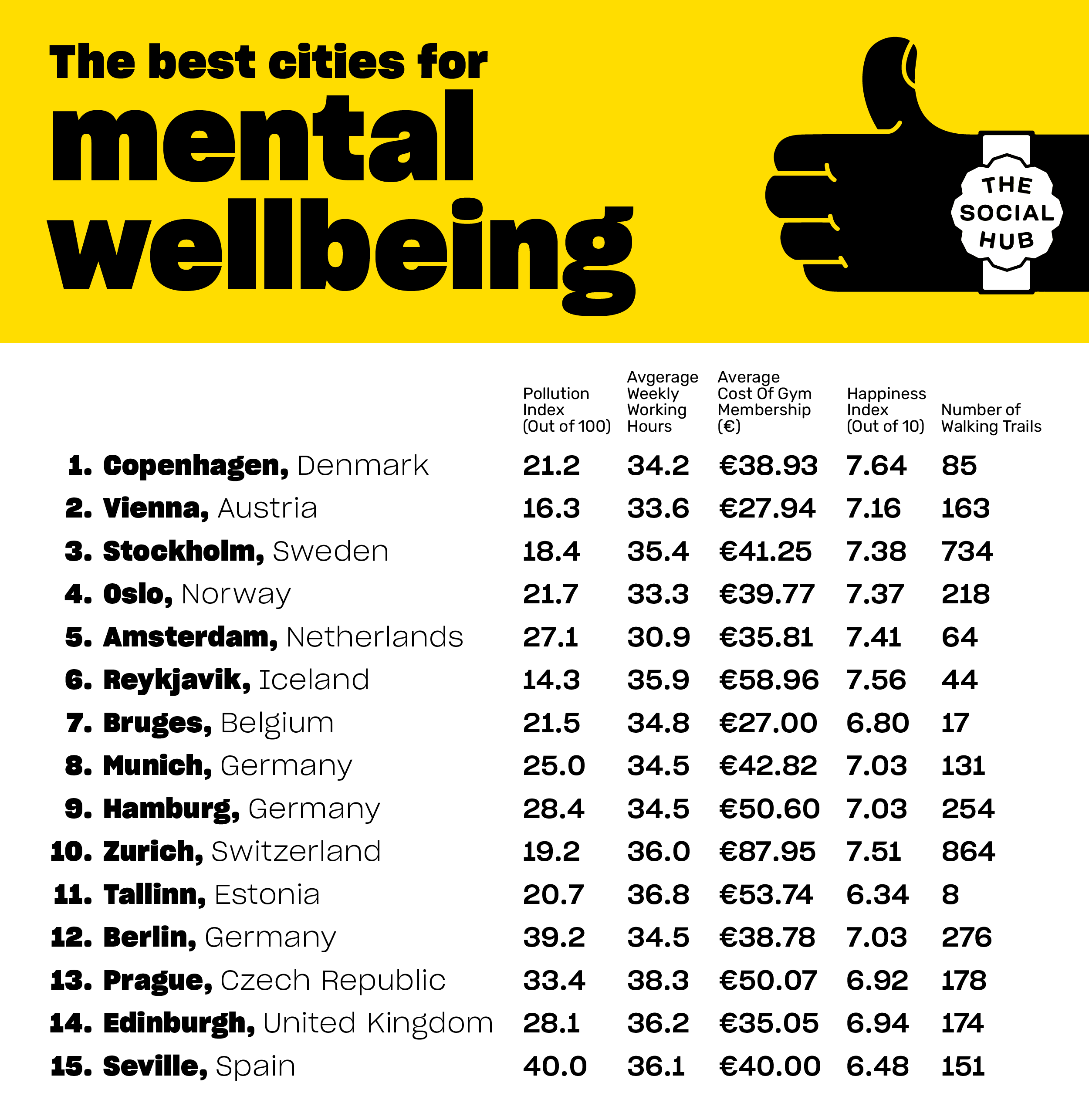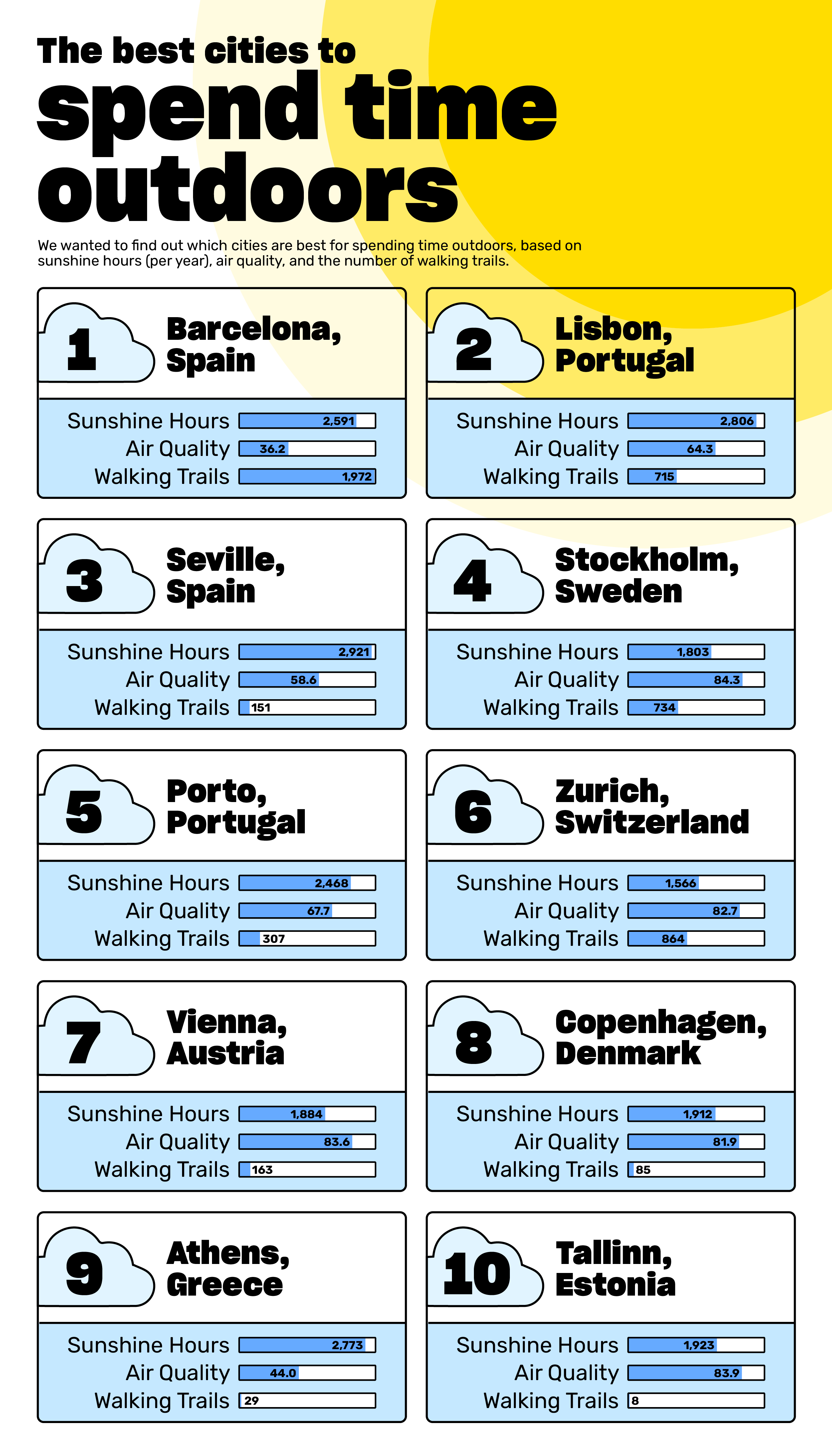Europe’s Best Cities for Mental Wellbeing
Life can be stressful – whether you’re a student, working, or just have a lot on your mind. Having an environment that you feel comfortable in is important for your mental wellbeing. But which European cities offer the best experience?
If you’ve ever felt overwhelmed by the demands of student life or the pressures of a career, you're definitely not alone. Having so much to juggle all at once sometimes means you’re left with no time to take care of your wellbeing, which can take a big toll on your mental health.
So we’ve put together this report to help you find the perfect European city to call home – a place that will support your mental health and wellbeing.
We’ve analysed 36 of the most popular cities in Europe, comparing a number of factors that are known to have a positive impact on your mental wellbeing – from the outside environment to the community around you. The full metrics analysed include sunshine hours, happiness rating, number of walking trails, air quality, pollution levels, average cost of a gym membership, average working hours, LGBTQ+ acceptance, and the prevalence of depression and anxiety.
But it’s also important to have the tools at hand to protect your wellbeing, so we chatted with some experts who have shared their top tips for reducing and managing stress. So, if you’re looking for a change of scenery or simply want to find a better place to take care of your mental health, keep reading for some inspiration.
The top European cities for mental wellbeing
There are a number of reasons why one city could be better for your mental wellbeing than another – from fresh air, to getting enough vitamin D, to living in an environment with a sustainable work-life balance. But life can be hectic, so it’s important to be in an environment that can help us take care of our mental and physical wellbeing.
Take a look at the cities that came out on top in our research, that will help make mental wellbeing a top priority.

1. Copenhagen
Home to some of the happiest people in Europe, Denmark’s capital, Copenhagen, ranks at the top of the list. The city offers fantastic air quality, scoring 81.9 out of 100, and low pollution levels (21.2). On average, residents can expect 1,912 hours of sunshine per year, and make use of 85 walking trails nearby.
Denmark, as a whole, scores better than any country for happiness with a score of 7.6 out of a possible ten. It is also one of the more LGBTQ+-friendly countries on our list, ranking second after Oslo for LGBTQ+ acceptance (90.5 out of 100).
2. Vienna
Dubbed Europe’s most underrated cultural capital, Vienna ranks as the second-best city in Europe for mental wellbeing. If working out is your favourite way to de-stress, you’ll be pleased to hear that a monthly gym membership in Vienna costs an average of just €27.94, making it one of the most affordable places.
Despite having a lower happiness index (7.16) than Denmark, depression is less prevalent in Austria, with 3.42% of its population facing this issue compared to 3.85% of Denmark’s.
3. Stockholm
It comes as no surprise that Scandinavian cities rank highly in this study, as they are widely known to promote mental and physical wellbeing. Stockholm ranks in third place with a happiness score of 7.4, the third-highest number of walking trails out of all cities analysed (734), and the second-best air quality (84.3).
If you like to hit the gym to get your endorphins flowing, then you can expect to pay around €41 per month – which is fairly average compared to the other cities.
4. Oslo
Norway’s capital Oslo ranks fourth overall. Although the sunshine hours per year are on the lower side (1,668), residents can benefit from low pollution levels (21.7), as well as fantastic air quality (77.1).
Norway takes the top spot for social progress with a score of 90.7 – the highest out of all cities. Socially progressive locations tend to be more inclusive, which means people are less likely to feel isolated and helps promote a sense of belonging and community among individuals from diverse backgrounds. They’re also more likely to have policies and practices that prioritise the wellbeing of the people who live there, like affordable healthcare or housing.
5. Amsterdam
Famed for its artistic heritage and intricate canal system, the Dutch capital of Amsterdam takes fifth place, thanks to a high air quality score of 74.8 points and affordable gym memberships of around €35 per month.
Although the number of walking trails is lower compared to other cities at 62, why not hop on a train and explore some other cities nearby? For example, the coastal city The Hague is less than an hour away from Amsterdam.
Dutch residents also benefit from a shorter work week with an average of 30.9 hours (the shortest out of all cities analysed), and LGTBQ+ acceptance is among some of the highest we looked at with a score of 89 out of 100.
6. Reykjavik
Reykjavik, known for its beautiful nature, takes sixth place with the highest air quality (87.5) and lowest pollution levels (14.3) of all places analysed.
While the number of walking trails in Reykjavik is among the lowest (44), there are plenty of scenic escapes to volcanoes, mountains, or even the sea for people to explore. However, the number of sunshine hours is the lowest out of all cities at 1,326 per year. This is due to the nation having only a few hours of sunshine during winter, whereas in summer, it can be daylight for 24 hours per day. Nevertheless, Iceland has the second-highest happiness score (7.6) after Denmark.
7. Bruges
Bruges closely follows Reykjavik in seventh place. The Belgian city, known for its cobbled streets and medieval look, has the second-lowest monthly cost for a gym membership at just €27. Despite the number of walking trails being low (17), the city offers some of the best air quality (82.5).
The average working hours per week in Belgium are some of the lowest at 34.8 hours and the nation’s happiness scored 6.8 points, making it an excellent location for mental wellbeing.
Munich, Hamburg, and Zurich round off the top 10. Overall happiness is the third-highest in Switzerland with a score of 7.5, although Germany isn’t far behind with seven points. Not only is the Swiss population happy, but nature lovers can rejoice as the city has 864 walking trails to choose from – the second-highest after Barcelona.
Scandinavian locations are known to promote a balanced way of living, so they will often rank highly in such studies. But are there any other cities that made the top ten that may have surprised you?
The best cities to spend time outdoors
It's no secret that soaking up sunshine can work wonders for our mental wellbeing. With benefits ranging from boosting serotonin levels to relieving anxiety and depression, it's clear that exposure to sunlight is crucial for our overall health. That's why we've decided to take a closer look at the top-ranking cities in terms of sunshine hours, number of walking trails, and air quality.
Barcelona ranks number one for these environmental factors, and it’s the place to be if a nice long walk is what you need to clear your head after a busy day. The city boasts 2,591 hours of sunlight each year and a whopping 1,972 walking trails to explore while you soak up the sun. Despite this, the overall air quality is among the worst, with a rating of 36.2.
Lisbon follows in second place, with over 200 hours more sunshine than in Barcelona, at 2,806 hours per year. Lisbon also has much better air quality with a score of 64.3, but slightly fewer walking trails (715).
Known for its scorching hot summers, Seville takes third place with more sunshine hours than any other European city analysed. The sun shines for 2,921 hours each year in the Andalusian city, but it has a mediocre score of 58.6 for its air quality and there are only 151 walking trails.

Top tips to live a well-balanced city life
Stress is a natural part of life, but it's important to take certain steps to help manage it, even if that’s sometimes easier said than done. We spoke to Consultant Clinical Psychologist Dr. Nicky Main and Kimberly Vered Shashoua, a therapist at VeredCounseling to provide you with a few tips to help reduce stress and improve overall well being.
1. Track your mood
Mood tracking and monitoring can help identify specific triggers for stress, and what a good day might look like. This can make it easier to establish ways of working and operating that are less stressful.
2. Try to ground yourself
Ask yourself, ‘will this matter in 10 years?’ This question helps put things in perspective. Getting a lower grade on one assignment isn't going to matter in the long run.
3. Prioritise the most important tasks
Not everything needs our attention, so consider which tasks you can drop. It's okay to whittle our to-do list to only urgent things. For example, wear clean laundry while it's in the basket, it's okay to not be on top of everything.
4. Reach out to people
Although stigma and shame might lead to some reluctance to talk to others, it’s important to speak up and connect with people, to talk about your problems, or just get some light relief. Try to talk to your employer or university about what ‘good’ looks like for you. Put structures and systems in place that will allow you to be at your best, such as flexible working or making sure you get a regular lunch break.
5. Move your body
Regular exercise is a great way to reduce stress and boost your mood. Whether it's a morning run, a yoga class, or a team sport, finding an activity that you enjoy and can stick to can have a big impact on your mental health.
6. Get enough sleep
Getting enough sleep is crucial for managing stress and maintaining good mental health. Aim for seven to eight hours of sleep per night, and try to establish a consistent sleep routine to help your body and mind get into a rhythm.
For more tips on improving mental wellbeing, check out our blog here.
Although where you live can have a positive influence on your mental wellbeing, one of the most important things is having a good support system around you. If something doesn’t feel right, or you’re struggling, reach out to friends, family, or seek professional help.
Here at The Social Hub we’re always here for you and are proud to offer free mental health support to employees, student guests, and co-workers at our Hotel.
Sign up and get 15% off on your hotel stays
Subscribe to our newsletter below and catch all our news and exclusive offers.
You're almost there
By providing your email address, you agree to our
Privacy Notice.